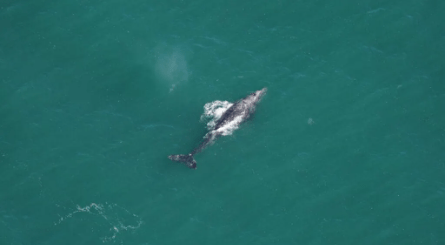Rare Gray Whale Sighting Sparks Hope for Atlantic Marine Conservation Efforts

In a remarkable discovery, researchers at the New England Aquarium in Boston announced the sighting of a rare gray whale in the waters south of Nantucket, marking the first such sighting in the Atlantic in over two centuries. This unprecedented event has stirred considerable interest among scientists and conservationists as they endeavor to address the challenges facing marine ecosystems and dwindling whale populations.
Unveiling the Rare Encounter
Last week, scientists from the New England Aquarium were astounded to observe a solitary gray whale approximately 30 miles south of Nantucket. The whale was spotted engaging in typical behaviors such as diving, resurfacing, and feeding, as reported by the Boston-based institution.
Gray Whales: A Tale of Survival and Adaptation
While gray whales are not classified as endangered, they have historically been absent from the Atlantic since their extinction over 200 years ago. These majestic creatures are predominantly found in the North Pacific Ocean, having been driven to extinction in the Atlantic due to extensive hunting.
Climate Change and the Return of Gray Whales
The unexpected appearance of the gray whale in Atlantic waters is attributed to the far-reaching impacts of climate change. Warming ocean temperatures, particularly in the Arctic, have facilitated an ice-free passage for whales between the Atlantic and Pacific Oceans during the summer months, allowing for this remarkable migration.
Insights from Marine Scientists
Orla O’Brien, an associate research scientist at the Anderson Cabot Center for Ocean Life, emphasized the significance of this sighting in the context of climate change. She remarked that it underscores the rapid response of marine species to environmental shifts when provided with the opportunity.
Alabama Attorney General’s Office: No Plans for Legal Action Regarding IVF
Conservation Concerns and Efforts
The resurgence of whale sightings in the Atlantic has prompted growing concerns among environmentalists regarding declining whale populations. Of particular concern is the North Atlantic right whale, classified as critically endangered with only approximately 360 individuals remaining, including a mere 70 breeding females.
Challenges Facing Right Whales
The North Atlantic right whale faces numerous threats, including vessel strikes and entanglements in fishing gear. Since 2017, an unusual mortality event has been documented, resulting in the deaths of 39 whales, with 14 attributed to vessel strikes and nine to entanglements.
Addressing Conservation Challenges
Environmentalists and policymakers have intensified efforts to protect the North Atlantic right whale. Measures such as implementing slow-down zones in high-traffic areas during migration seasons and regulating the use of vertical lines in lobster traps have been enacted to mitigate the risk of collisions and entanglements.
Transitioning to Ropeless Lobstering Gear
In response to conservation concerns, there has been advocacy for transitioning to ropeless lobstering gear to minimize the impact on whale populations. However, some lobstermen have expressed reservations about the effectiveness of such equipment, raising concerns about potential economic repercussions.
The Plight of Humpback Whales
In addition to the challenges facing right whales, humpback whales have also experienced significant losses along the East Coast in recent years. Despite efforts by organizations like the Marine Mammal Stranding Center and NOAA to investigate the increase in humpback whale deaths since 2016, the exact causes remain undetermined.



